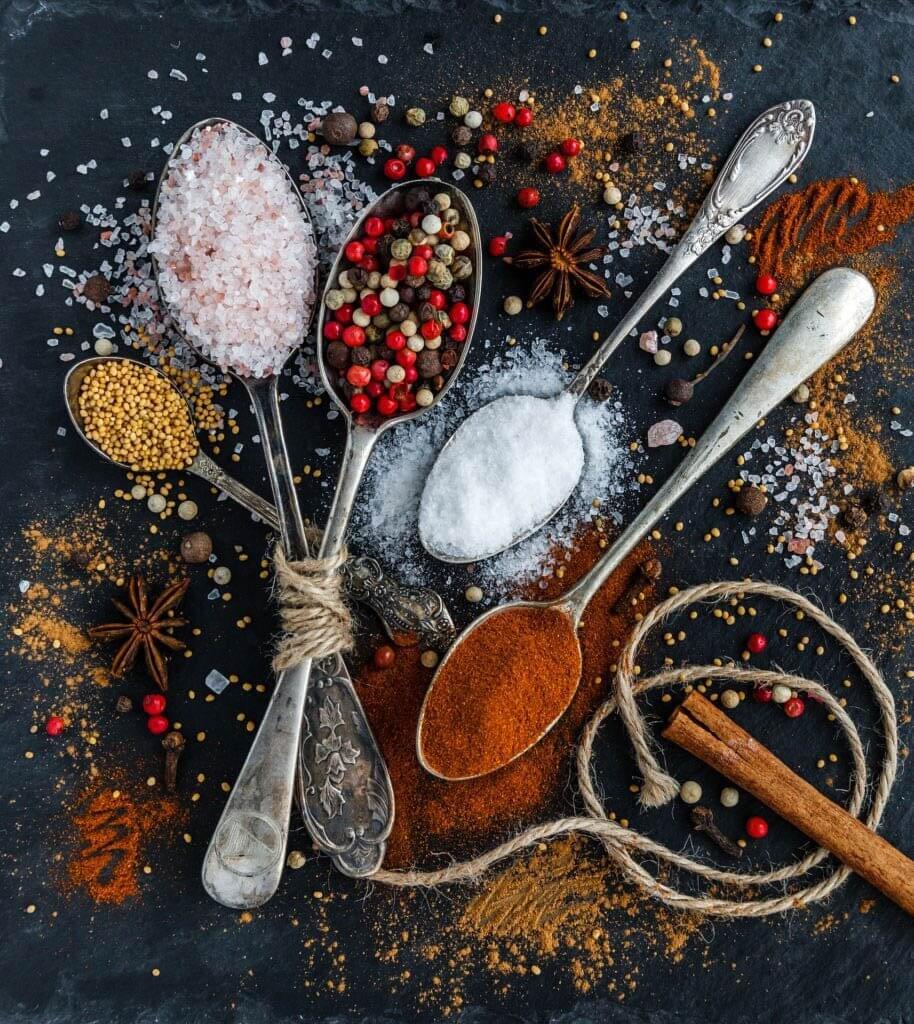
Table of contents
10 spices that belong in every spice shelf
Without spices, some of our dishes would taste much more boring and unspectacular. But apparently there are now countless different spices, and spice mixtures are also becoming more and more popular. If you cook according to a recipe, you will often find very special spices that you don't necessarily have at home. Are they worth purchasing? So what are important spices that are part of the basic equipment of every household?
Interesting facts about spices
Our nomadic ancestors already seasoned their dishes; for example, coriander was used in Israel 23,000 years ago and garlic mustard in the Baltic region 6,000 years ago. In medieval Europe, spices were treated like treasures and nutmeg and cloves were important status symbols.
A spice that each of us uses most often - pepper - was once as valuable as gold! In the Middle Ages people also liked to show off their possession of cinnamon.
The most expensive spices today are saffron, vanilla and cardamom. The value of a spice depends on various factors. This includes not only availability and production conditions, but also how trendy a spice is currently. And of course the same applies here: the less there is, the more valuable a spice is.
What are spices made of and what are they good for?
Plant parts such as leaves, bark, seeds or fruits are considered spices. But buds, flowers or plant roots as well as onions can also be spices.
In addition to the obvious function of spicing up food and enhancing or enhancing flavors, spices are also used as preservatives and as a base for medicines. Pepper, for example, also stimulates digestion and rosemary stimulates the appetite.
Spice blends are becoming increasingly popular at the moment because they are easy to use and you don't have to buy ten spices individually, but can find all of these spices at once in one product. For many people, they are now one of the basics in the kitchen. The disadvantage of these spice mixtures is that you cannot use the ingredients in isolation if you need them individually.
Today I would like to focus on individual important spices that are useful in every kitchen and that represent a solid basic equipment for everyone.
10 important spices for your kitchen
1. Paprika
Paprika gives almost all main dishes a nice basic flavor. The different types of peppers differ primarily in their level of spiciness. The most popular variant is sweet paprika and gives dishes a warm, intense aroma, but also gives off a pleasant fruitiness. The slightly hotter and often used variety is paprika roshot.
This spice goes well not only with vegetable soups and stews, but also with pasta and savory spreads. It is also suitable for marinades and dips. The use of peppers knows almost no limits.
2. Oregano
This Mediterranean spice not only smells super pleasant, but is also suitable for almost any Italian or Greek dish. Whether on pizza, in salads, soups, sauces or with vegetables - oregano enhances all these dishes with its spicy, slightly spicy aroma. Unlike other spices, oregano does not develop bitter substances if cooked for too long, so it can be cooked for a long time.
3. Cayenne pepper
The name of this hot spice is misleading: Cayenne pepper is not an exotic type of pepper at all, but a type of chili. It is often used in Indian, Spanish, Portuguese and Indonesian cuisine and although it harmonizes ideally with paprika and curry, it should be used sparingly when combined with other spices, otherwise the spiciness of the cayenne pepper will dominate and drown out the other spices.
It not only goes wonderfully with meat and fish dishes, but also with soups and stews. And – if you’re keen to experiment – you should definitely mix cayenne pepper into your hot chocolate!
4. Curry
Okay, a spicemixture It makes it into my top 10 spices – an absolute must-have for me. Depending on the blend, curry powder can consist of 13 to 36 different spices! Standard components include chili, turmeric (which gives the curry its typical yellow color), cardamom, coriander, cumin, cinnamon, ginger, clove and nutmeg. Due to the individual mixing ratios, curry varies in taste from sweet to spicy.
Curry is a very important component in many Indian dishes and exotic combinations with pineapple or coconut milk, but it also goes great with oriental rice pans, dressings and sauces.

Photo by Peter Heeling on skitterphoto
5. Cumin
Cumin, as cumin is also known, is one of the most popular spices worldwide and is primarily used in oriental and Asian cuisine. Most of us are probably familiar with the fresh and slightly spicy aroma of cumin from hummus and falafel. But it also goes great with rice and grains and of course with vegetables, couscous and bulgur. It is mainly used in the ground version.
In terms of taste, cumin has very little in common with caraway, which is more common in our country, and is also better combined with other spices than its European relative.
6. Ginger
This spice has become an integral part of Asian cuisine. The fruity, spicy tuber provides a lemony, fresh taste and gives many dishes that certain something. Freshly cut in tea, it has a healing effect on nausea and colds. But it is also often used as a powder in Asian soups, sauces, meat and fish dishes. But desserts such as fruit salads and cakes can also be spiced up with ginger.
7. Nutmeg
Nutmeg is used freshly grated and refines potato dishes, soups and stews. But meat dishes such as meatballs and vegetables such as cabbage, spinach or pumpkin also benefit from the seeds of the nutmeg tree. Since the aroma disappears quite quickly, you should not cook the spice but only add it to the dish shortly before serving. By the way, some sweet dishes such as rice pudding, semolina porridge, apple and cherry cake can also be refined with nutmeg!
8. Cinnamon
Cinnamon is also an all-rounder and popular all-rounder in almost every kitchen. For me, cinnamon is a must in my morning porridge. Cinnamon is also often an integral part of chai teas, cakes, cookies and apple crumble. However, this spice is not just something for those with a sweet tooth: it also goes very well with savory dishes such as sauces or red cabbage and harmonizes perfectly with ginger and cardamom.

Photo by Luisa Schetinger on Unsplash
9. Vanilla
The particularly sweet taste of vanilla particularly refines cakes, ice cream and other desserts and is therefore particularly used in baking. But it is also used as a syrup in coffee and cocoa specialties.
To get the full flavor, it's best to use a real vanilla pod from which the black pulp is scraped out. Unfortunately, vanilla beans are very expensive, which is why artificially produced vanillin is often used. The fact that real vanilla is not cheap is mainly due to the very complex cultivation and harvesting processes.
10. Pepper and salt
I actually assume that everyone has these two spices at home.
Salt belongs in almost all dishes - whether baking, cooking or frying. The following applies: the finer the grain, the better the aroma develops. Sweet dishes also benefit from a pinch of salt because it highlights the other flavors.
Black pepper is the perfect remedy for a bland taste, but should be used carefully as the spiciness is difficult to neutralize. Nevertheless, there is hardly a dish that cannot be seasoned with pepper. It is now also being used more and more frequently in desserts and chocolate compositions.
If you would like to find out more about the topics of healthy eating, mindfulness or sustainability, take a look here over.
Please let me know in the comments below which important spices you think should be in every kitchen!

Photo by Sonja Punz on Unsplash





























Leave a comment
This site is protected by hCaptcha and the hCaptcha Privacy Policy and Terms of Service apply.